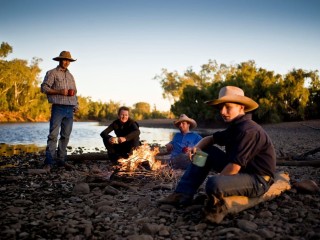 Some of Australia’s leading occupational physicians have received a wake-up call from experts working in the fields of rural health and wellbeing.
Some of Australia’s leading occupational physicians have received a wake-up call from experts working in the fields of rural health and wellbeing.
Members of the Australasian Faculty for Occupation and Environmental Medicine (AFOEM) heard speakers at a recent seminar including an agricultural health and medicine lecturer, AgriSafe clinician, rural vet and a clinical professor outlining the issues faced by rural industry.
The range of human health risks associated with living and working in the bush was broad, and included events unusual to everyday medicine such as potentially serious complications from needle-stick injuries associated with vaccinating livestock for common diseases.
AFOEM meeting chair Dr Judy Balint described the meeting as enlightening for the doctors involved, many of whose practises are city or larger community based.
“Farming is a community group that a lot of us have not had a lot to do with,” Dr Balint said.
“But the presenters did a valuable job in introducing us to the health challenges faced by people on the land – both because of their work and their remote locations,” she said.
“The range of presentations covered chemicals, ergonomics, other areas of workplace safety needs and the ever-present issue of mental and general wellbeing.
“It was alarming to learn from statistics that the further a farmer is from help, the longer they tend to delay making vital decisions about seeking medical assistance. These are parts of the rural stereotype which need to be understood, and broken down,” she said.
Dr Balint said that as a medical community, doctors providing occupational and environmental medicine needed to be much more conscious of the special needs of the agricultural sector.
She said people in rural and remote areas were getting a little more accepting of issues such as mental health, but there was still a long way to go.
“The feedback from the doctors who attended the forum was incredibly positive,” Dr Balint said.
“They were amazed at how little they knew of the area and were keen for more information on agricultural health and medicine,” she said.
Dr Richard Lunz, a past AgriSafe manager with the National Centre for Farmer Health based at Western District Heath Service in Hamilton, Vic, and now training as a specialist in occupational health, said the work NCFH was doing and the way it was raising awareness for the rural community was outstanding.
He said the tyranny of distance was one of the biggest challenges still facing rural medicine in Australia.
“It cuts both ways – getting farmers to make long trips to big cities for specialist help, and getting doctors to commit to serving remote locations and understanding the uniqueness of farmers and agricultural workers.”
“We need to refine it: farmers are smart people but doing a full rehab program, for example, can be a challenge, just in the travel and making the time available,” he said.
“But the response at the NCFH presentation was very encouraging. The doctors asked a lot of questions and were already looking for ways at improving services.”
Another issue faced by farmers and graziers was as basic as health insurance. Even if farm families could afford health insurance, the way their businesses are structured can impact on how effective that can be, Dr Lunz said.
Clinical associate professor Susan Brumby, foundation director of NCFH, who has worked in agriculture and health for 25 years, presented on the need for both rural health and the agricultural workforce to have the skills, education and understanding of agricultural health and medicine when working in and with farming communities.
Dr David Rendell, a livestock vet spoke on veterinary chemicals commonly used in livestock industry and their safety issues while Dr Scott McCoombe, course chair at Deakin University spoke on agricultural emergencies and farm injuries.
